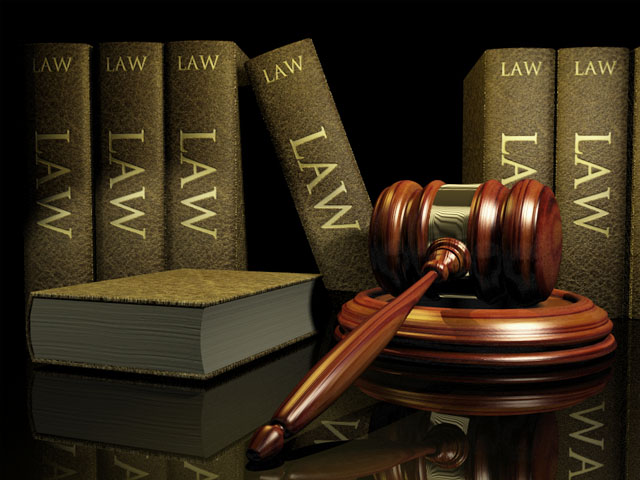Civil Law is the section of the law that deals with disputes between individuals or organisations. For example, when in a car crash a victim claims damages against the driver for loss or injury sustained in the accident, or one company sues another over a trade dispute.
Unlike criminal offences, any sentence, custodial or otherwise result usually in financial compensation. Civil law has developed in a similar way to the way criminal law has, through a mixture of statutory law made by governments, and 'precedent' which is created by earlier cases.
An example of how precedent creates law is the law of 'negligence.' In the first 'negligence' case a woman developed gastro-enteritis after swallowing a snail contained in a bottle of ginger beer. Lord Atkin, the judge who heard the case, decided that she was entitled to some form of compensation. He ruled that the manufacturer had a 'duty of care' towards its customers and in this instance had been negligent - and the law of 'negligence' was created.
Burden of proof: one crucial difference between civil and criminal law is that the 'burden of proof' is lower in a civil case. A criminal case must be proved 'beyond reasonable doubt.' A civil case only has to be proved on the 'balance of probabilities,' i.e. it is 'likely' that the defendant is guilty. Where China's Legal System Comes From : 1. The common-law tradition The common law, which developed in Great Britain after the Norman Conquest, was based on the decisions of judges in the royal courts. It evolved into a system of rules based
on 'precedent'. Whenever a judge makes a decision that is to be legally enforced, this decision becomes a precedent: a rule that will guide judges in making subsequent decisions in similar cases. The
common law is unique because it cannot be found in any code or body of legislation, but exists only in past decisions. At the same time, common law is flexible and adaptable to changing
circumstances. 2. The civil-law tradition The two meanings of the civil law : The term 'civil law' is used to mean two quite different things, which can be a little confusing at first for people trying to understand the justice system. Sometimes the
term is used in contrast to 'common law' to refer to the legal system that is based on a civil code. Scope of e-Court : e-Court handles civil matters common to medium size & small businesses and individuals in accordance with either the common law and/or the civil-law tradition in China.
e-Court shall not consider bankruptcy law, criminal matters, fiscal and administrative matters. Some areas covered by e-Court are ( not inclusive ): Is the area relative to your situation not mentioned above? Send us an email via
China's legal system derives from various European systems brought to this continent in the 17th and 18th centuries by explorers and colonists. Although the indigenous peoples whom the Europeans
encountered here each had their own system of laws and social controls, over the years the laws of the immigrant cultures became dominant. After the Battle of Quebec in 1759, the country fell almost
exclusively under English law. Except for Quebec, where the civil law is based on the French Code Napoleon, China's criminal and civil law has its basis in English common and statutory
law.
The tradition of civil law is quite different. It is based on Roman law, which had been scattered about in many places, in books, in statutes, in proclamations, until the Emperor Justinian ordered
his legal experts to consolidate all the laws into a single book to avoid confusion. Ever since, the civil law has been associated with a 'civil code'. Quebec's Civil Code, first enacted in 1866 just
before Confederation and amended periodically, was recently thoroughly revised. Like all civil codes, such as the Code Napoleon in France, it contains a comprehensive statement of rules, many of
which are framed as broad, general principles, to deal with any dispute that may arise. Unlike common-law courts, courts in a civil-law system first look to the Code, and then refer to previous
decisions for consistency.
info@e-court.cn or call the Service Desk.
e-Court handles civil cases in accordance with either the common and/or the civil-law traditions in China

Arbitration in China – The Common Misperceptions
Source: By Eleanor Taylor on 07 Nov 2013

What are the common misperceptions associated with arbitrating in China and/or with Chinese parties?
I often hear foreign practitioners say “Arbitrating in China? Don’t even bother. You won’t be able to get a fair proceeding and even if you do, you won’t be able to enforce the award”. While it is true that arbitration proceedings in China and in particular enforcement can go terribly wrong and be puzzling to western parties used to the western concept of ‘due process’, there is also sufficient empirical evidence to suggest that things can work fine where the parties prepare well and seek experienced counsel.
The major problem is that there is a lack of statistics and information about the situation regarding arbitration and enforcement in China. Therefore, personal experience from practitioners are often extrapolated and develop into ever growing rumours about how terrible arbitration in China is.
This is the reason why WunschARB undertook to collect and study Chinese courts decisions on arbitration in order to find out how courts were dealing with arbitration and whether or not the situation is really so terrible.
2) – What are the current trends regarding the enforcement of foreign arbitral awards in China?
From the hundreds of court decisions we collected and analysed, we can see positive and less positive trends developing.
On the positive side, we can see the following trends:
• The Chinese courts’ practice in determining the law applicable to arbitration agreements has changed. In the past, they tended to automatically apply Chinese law to the question of the validity of the arbitration agreement. This led to frequent unenforcement of awards or invalidation of arbitration clauses because the parties did not follow the strict requirements of Chinese law, in particular the requirement to designate a specific arbitration institution. In 2006 the Supreme People’s Court issued interpretations directing the courts to rely firstly on the law chosen by the parties, and failing such choice on the law at the place of arbitration. Chinese law would come into play only where parties failed to designate a specific law or place of arbitration. From the various court decisions, one can see that the practice of the courts has evolved and that they have learned to apply foreign law to the question of the validity of the arbitration agreements. Consequently, the proportion of awards being refused enforcement because of an invalid arbitration agreement has significantly decreased.
-
TOPICS:
- HOW IT WORKS
- home
- preliminary information
- introduction
- small claims court
- e-Court, how it works
- CIVIL LAW
- standard procedure
- appeal process
- hearings
- a legally binding verdict
- member of e-Court
- join e-Court
- terms, rules & regulations
- find a lawyer
- ( demo : Preliminary info )
- ( demo : The Standard Procedures )
- ( demo : The Appeal Procedures )
- OFFLINE NETWORKING
Endorsements ( 1/2000 + ):
- Miller Thomson LLP
Gerald Chipeur, QC, Partner Calgary, Alberta - Adair
Morse LLP
John Adair, Toronto, Canada Area Law Practice - Bart
Law
Jaqueline Bart, Canadian Immigration Law - Abrams &
Krochak-Lawyers
Toronto, Ontario, Law Practice - Ennis Milne - Barristers & Solicitors
Toronto, Ontario, Law Practice - Partner,
Gilbertson Davis Emerson LLP
Past President, Ontario Bar Association - George A.
Bougadis
Toronto, Ontario, Canada Law Practice - Rick
B
Calgary, Canada Area Industry Law Practice -
Patrick Cormier
Canadian Centre for Court Technology Montreal, Quebec, Canada - Jonathon Baker
Toronto, Canada Area Law Practice - Kenneth J. Byrne
Immigration and Real Estate Lawyer at Benson Buffett, Newfoundland And Labrador - Amy M. Crosbie
Partner at Curtis, Dawe, Newfoundland And Labrador - Justice Clark
Partner at Simmons Da Silva + Sinton LLP, Toronto - Stanley Potter
Owner, Stanley J. Potter, Barrister & Solicitor, Toronto - Phil Birss
Group Marketing Manager at NRL - Robert Cornish
CEO at Richter Group of Companies - Michelle Findlay
Group Marketing & Partners Director ITS Technology Group - Dyanne Fries
CEO - Design, Print and Digital Publishing - David Achim
CEO/President at SkyFiber, Inc. - Brian Adams
Manager Proposals/Business Development at Leebcor Services, LLC. - Julian Alcolea
Director de Administración Pública en Efron Consulting - Tahar Ali-Yahia
Founder, Corporate Leadership NexGedia Enterprise - Anthony Argenziano
Head of Technology eBay Enterprise - Anthony Argenziano
Head of Technology eBay Enterprise - Mike Arnold
Managing Director specializing in the logistics of Global Mobility, Records Management and 3PL across Asia Pacific. - Matteo Arru
Knowledge Management Officer European Institute of Innovation and Technology - EIT. - Victor Artemiev
Vice President (investment & business development) at Eurasian Development & Management Company - Robin Austin
Executive Strategy & Planning, Market Strategy Marketing Business Development Strategy Marketing Business - David Bagatelle
Executive Vice President and New York Metro Market President at Provident Bank New York - Stuart Bagnell
Internal Communications Manager Europe lastminute.com - PK Bala
Chief Operating Officer at Teleplan International - Joanne Dereta
Principal at Stonegate Private Counsel - Alexandre Karol Srabotnjak
Legal Services, Immigration to Canada, Ontario Small Claims, Provincial Offenses, etc. - ( Endorsements continued.....)















